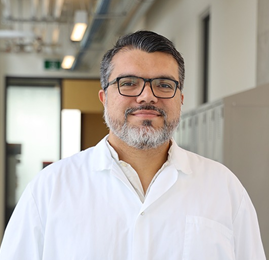Ga offline met de app Player FM !
Argel Aguilar Valles, Carleton University – Can Non-Hallucinogenic Psychedelics Be Used to Treat Depression
Manage episode 430794846 series 2459839
 Psychedelics may be the way out of depression.
Psychedelics may be the way out of depression.
Argel Aguilar Valles, assistant professor in the department of neuroscience at Carleton University, explores why.
Dr. Argel Aguilar Valles received his B.Sc. (Biology) and M.Sc. (Biochemistry) from the National Autonomous University of Mexico (UNAM). Then, he obtained his Ph.D. in Neuroscience at McGill University in 2011. Following this, he completed two postdoctoral fellowships at the Scripps Research Institute (Florida Campus) in 2012 and at McGill University in 2018. He joined Carleton University in 2019 as an Assistant Professor. The Aguilar-Valles Lab is interested in the molecular mechanisms that underlie psychiatric and neurodevelopmental disorders. They use a combination of biochemistry, molecular biology, neuronal culture, and animal models to understand the molecular mechanisms of mental illness and their potential treatments.
Can non-hallucinogenic psychedelics be used to treat depression
https://academicminute.org/wp-content/uploads/2024/07/07-26-24-Carleton-Can-non-hallucinogenic-psychedelics-be-used-to-treat-depression.mp3Depression is one of the most significant challenges of our time, affecting over 280 million people worldwide. The most widely prescribed type of antidepressant medication is selective serotonin reuptake inhibitors or SSRIs, but they only have a 60 percent effectiveness rate, and it can take months on daily medication for patients to begin feeling better, a difficult wait for those already struggling with low mood or suicidal thoughts.
The exact biological causes of depression remain unclear, but chronic stress can cause significant damage to neurons, dulling our responses and reducing cognitive function. Psychedelics, a category of drugs that includes lysergic acid diethylamide (or LSD) and psilocybin, can help the brain repair some of that atrophy. Psychedelics are unique in that they cause profound changes in consciousness and promote neuroplasticity, the ability of the brain’s neural network to rewire itself.
We recently found that 2-Bromo-LSD, a non-hallucinogenic derivative of or LSD, could be a treatment option for depression and anxiety. 2-Bromo-LSD was synthesized in 1940 by Swiss chemist Albert Hofmann at the same time as regular LSD; the drug initially drew less attention compared to its flashier, hallucination-inducing sibling. Today, the lack of “trip” is a major selling point for researchers as they explore whether 2-Bromo-LSD could work as an antidepressant, harnessing the power of its unique neurological profile without the inconveniences of sensory impairment. Indeed, our initial findings suggest that 2-Bromo-LSD can rapidly induce neuroplasticity and reverse the effects of chronic stress in mice. Despite their promise these results should be validated in depression patients for efficacy and safety.
Read More:
[Carleton] – Beyond the Magic of Mushrooms Using Psychedelic Derivatives to Treat Depression
[ScienceDirect] – A non-hallucinogenic LSD analog with therapeutic potential for mood disorders
The post Argel Aguilar Valles, Carleton University – Can Non-Hallucinogenic Psychedelics Be Used to Treat Depression appeared first on The Academic Minute.
287 afleveringen
Manage episode 430794846 series 2459839
 Psychedelics may be the way out of depression.
Psychedelics may be the way out of depression.
Argel Aguilar Valles, assistant professor in the department of neuroscience at Carleton University, explores why.
Dr. Argel Aguilar Valles received his B.Sc. (Biology) and M.Sc. (Biochemistry) from the National Autonomous University of Mexico (UNAM). Then, he obtained his Ph.D. in Neuroscience at McGill University in 2011. Following this, he completed two postdoctoral fellowships at the Scripps Research Institute (Florida Campus) in 2012 and at McGill University in 2018. He joined Carleton University in 2019 as an Assistant Professor. The Aguilar-Valles Lab is interested in the molecular mechanisms that underlie psychiatric and neurodevelopmental disorders. They use a combination of biochemistry, molecular biology, neuronal culture, and animal models to understand the molecular mechanisms of mental illness and their potential treatments.
Can non-hallucinogenic psychedelics be used to treat depression
https://academicminute.org/wp-content/uploads/2024/07/07-26-24-Carleton-Can-non-hallucinogenic-psychedelics-be-used-to-treat-depression.mp3Depression is one of the most significant challenges of our time, affecting over 280 million people worldwide. The most widely prescribed type of antidepressant medication is selective serotonin reuptake inhibitors or SSRIs, but they only have a 60 percent effectiveness rate, and it can take months on daily medication for patients to begin feeling better, a difficult wait for those already struggling with low mood or suicidal thoughts.
The exact biological causes of depression remain unclear, but chronic stress can cause significant damage to neurons, dulling our responses and reducing cognitive function. Psychedelics, a category of drugs that includes lysergic acid diethylamide (or LSD) and psilocybin, can help the brain repair some of that atrophy. Psychedelics are unique in that they cause profound changes in consciousness and promote neuroplasticity, the ability of the brain’s neural network to rewire itself.
We recently found that 2-Bromo-LSD, a non-hallucinogenic derivative of or LSD, could be a treatment option for depression and anxiety. 2-Bromo-LSD was synthesized in 1940 by Swiss chemist Albert Hofmann at the same time as regular LSD; the drug initially drew less attention compared to its flashier, hallucination-inducing sibling. Today, the lack of “trip” is a major selling point for researchers as they explore whether 2-Bromo-LSD could work as an antidepressant, harnessing the power of its unique neurological profile without the inconveniences of sensory impairment. Indeed, our initial findings suggest that 2-Bromo-LSD can rapidly induce neuroplasticity and reverse the effects of chronic stress in mice. Despite their promise these results should be validated in depression patients for efficacy and safety.
Read More:
[Carleton] – Beyond the Magic of Mushrooms Using Psychedelic Derivatives to Treat Depression
[ScienceDirect] – A non-hallucinogenic LSD analog with therapeutic potential for mood disorders
The post Argel Aguilar Valles, Carleton University – Can Non-Hallucinogenic Psychedelics Be Used to Treat Depression appeared first on The Academic Minute.
287 afleveringen
Tutti gli episodi
×Welkom op Player FM!
Player FM scant het web op podcasts van hoge kwaliteit waarvan u nu kunt genieten. Het is de beste podcast-app en werkt op Android, iPhone en internet. Aanmelden om abonnementen op verschillende apparaten te synchroniseren.




